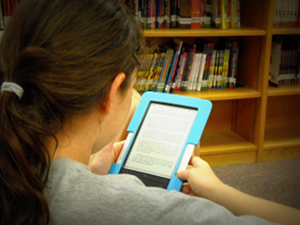 Hear that? That’s the collective sound of a thousand publishing industry jaws hitting the floor.
Hear that? That’s the collective sound of a thousand publishing industry jaws hitting the floor.
In a Library Journal item posted today, reporter Michael Kelley writes that Random House—one of the so-called Big Six publishers, don’t forget—has made a rather stunning proclamation in regards to their sales of e-books to libraries. The following quotes are the words of Skip Dye, Random House’s vice president of library and academic marketing and sales, who participated in two recent interviews with Kelly:
“When libraries buy their RH, Inc. ebooks from authorized library wholesalers,” says Skip Dye, Random House’s vice president of library and academic marketing and sales, “it is our position that they own them.”
“This is our business model: we sell copies of our ebooks to an approved list of library wholesalers, and those wholesalers are supposed to resell them to libraries. In our view, this purchase constitutes ownership of the book by the library. It is not a license.”
Interestingly enough, Kelley says that this potentially industry-altering turn of events is not actually news. “It came up at the Massachusetts Library Association conference in May,” he writes, “[and] it was bruited about at the American Library Association (ALA) annual meeting in Anaheim in June.”
In light of this (old) news, Kelley goes on to warn librarians that they should “ensure that whatever licenses they are signing with vendors or aggregators do not unwittingly curtail or sign away the rights that entail from this frankly avowed ownership, particularly user exceptions under copyright law.”
Click here to read the full article.
* * *
Follow us on Twitter @TeleRead
Join us at facebook.com/TeleRead


































Have the people at RH read the ARL Code of Best Practices in Fair Use for Academic and Research Libraries? http://www.arl.org/pp/ppcopyright/codefairuse/index.shtml Under the theory of “transformative use” advocated there, a teacher may use an entire novel or work of nonfiction for classroom assignment without permission of the publisher since this is a different purpose in using the work than what was originally intended by the author and publisher, who are aiming at the general public as the market. The only requirement is that the teacher have a sound pedagogical reason for using the entire work rather than just a portion. By taking ebooks out from under the protection of licensing, RH is playing right into the hands of the ARL leaders who have adopted this policy. So, maybe the next stop will be the courtroom–again!